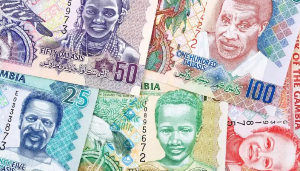Minimum wage is the least amount paid to workers of any country which is expected to help them afford their basic needs.
Unfortunately, employees do not earn enough in some parts of the world including Africa.
However, some African countries have managed to formulate effective policies that address the welfare of workers and ensure they are paid well.
Below are African countries with the highest minimum wage as listed by International Labour Organization:
1. Seychelles – Minimum Wage: $404
Seychelles, the Indian Ocean archipelago of fewer than 133,000 people, maintains Africa’s highest minimum wage at $404. With just over 53,000 employed and an unemployment rate of 3%, the nation projects 3.5% growth in 2025, anchored by tourism, fisheries, and financial services. Nominal GDP is estimated at $2.2 billion, or $21,630 per capita, while inflation is forecast at just 1.7%. On April 1, 2025, Seychelles enacted its first minimum wage review since January 2020.
2. Mauritius – Minimum Wage: $377
Mauritius continues to rank among Africa’s most diversified economies, with a minimum wage of $377. The island nation, home to 1.27 million people, has a labor force of 595,000. GDP is estimated at $15.5 billion, or $12,330 per capita, with 2025 growth projected at 3%. Inflation is expected at 3.6%, underscoring the challenge of balancing growth and cost of living. The most recent wage hike took effect in January 2024.
3. Morocco – Minimum Wage: $362
Morocco, with a population of 38.4 million, maintains a minimum wage of $362. GDP is estimated at $165.8 billion, or $4,400 per capita, with purchasing power parity lifting it to $11,270. Growth is projected at 3.9% in 2025, while inflation stands at 2.2%. The government last raised wages in January 2025 and plans a 20% increase in 2026. Agriculture, manufacturing, and services remain key drivers of its steady expansion.
4. South Africa – Minimum Wage: $273.15
South Africa, Africa’s most industrialized economy, sets its minimum wage at $273.15. With a population of 64.7 million and unemployment at 32.8%, growth remains sluggish at 1% in 2025. Nominal GDP is $410.34 billion, or $6,400 per capita. Inflation is projected at 3.8%. On March 1, 2025, the government raised the hourly wage to R28.79, seeking to ease inequality amid slow recovery.
5. Equatorial Guinea – Minimum Wage: $231
Equatorial Guinea, with a population of 1.94 million, pays a minimum wage of $231. Once among Africa’s wealthiest per capita due to oil, the country faces contraction with GDP projected to shrink by 4.2% in 2025. Nominal GDP stands at $12.68 billion, or $7,750 per capita. Inflation at 4% compounds pressures on households already burdened by stagnation and limited benefits from resource wealth.
6. Libya – Minimum Wage: $185
Libya sets its minimum wage at $185. With 7.48 million people, the country’s economy is valued at $47.5 billion, though large informal activity—32% of GDP—distorts official estimates. Projections suggest GDP could rise to $215 billion by 2026, contingent on oil stability and improved governance. Despite political uncertainty, Libya’s per capita output in PPP terms remains strong relative to regional peers.
7. Tunisia – Minimum Wage: $181
Tunisia maintains a minimum wage of $181. Its 2025 GDP is projected at $56.29 billion, or $4,530 per capita, with 3.6 million people employed. Growth remains modest at 1.4%, insufficient to absorb labor market entrants. Inflation at 6.1% erodes household incomes, straining an economy already facing global uncertainties and structural hurdles.
8. Algeria – Minimum Wage: $154
Algeria’s minimum wage is set at $154. Home to 47.6 million people, its employed population stood at 13.2 million in 2024. Nominal GDP is projected at $268.9 billion, or $5,690 per capita, with growth forecast at 3.5% in 2025. Hydrocarbons remain the backbone of the economy, though diversification efforts continue. Inflation is contained at 3.7%, providing relative stability in a volatile region.
9. Egypt – Minimum Wage: $145
Egypt, with nearly 119 million people, offers a minimum wage of $145. GDP is estimated at $347 billion, or $4,000 per capita, with growth forecast at 4.2% in 2025. Despite robust output, inflation above 20% continues to erode purchasing power. Unemployment stands at 7.7%. Remittances and Suez Canal revenues remain vital, even as subsidy reforms and rising costs weigh heavily on households.
10. Mauritania – Minimum Wage: $112.64
Mauritania sets its minimum wage at $112.64. With 5.3 million people, the nation’s GDP is valued at $11.47 billion, or $2,480 per capita. On a PPP basis, GDP rises to $40.1 billion, or $8,650 per capita. Growth is projected at 4.4% in 2025, supported by resource extraction, while inflation remains at 3.5%. Despite challenges, the country shows progress in diversification and relative stability in prices.
Business News of Sunday, 28 September 2025
Source: www.thenationonlineng.net













